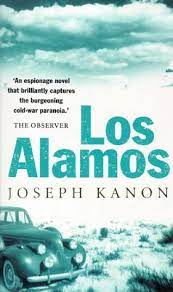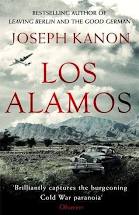GoodReads meta-data is 416 pages, rated 4.80 by 2,759 litizens.
Genre: krimi.
Verdict: Trinity!

March 1945 in the high desert of New Mexico near Santa Fé: Get it? A security officer has been murdered and his mutilated body was found miles away, well outside the perimeter of that strange town on the mesa, and I don’t mean Santa Fé. Get it? Nothing must delay the work in the town and a special investigator arrives to put a lid on speculation while getting to the bottom of the crime. Get it?
Welcome to Atomic City at Los Alamos, along the dried up Alameda River, near Alamogordo and Trinity. Get it? Little Boy and Fat Man are aborning. Inside two layers of barbered wire, patrolled by armed guards and dogs, illuminated at night, observed from watch towers, beyond innumerable checkpoints, all monitored by aerial reconnaissance 5,000 people live and work, many with German, Italian, Polish, and Slavic names, each with a pointy head. Among them are immature college boys and all of them are A-class nerds with no interest in the manly arts of pissing contests. In addition there are several thousand guards and construction workers, some of whom regard these alien pin heads with contempt, which is reciprocated by the some of the boys. It is many worlds in one.
Into this mix is thrown our hero, sent from furtherest D.C. to see what he can see about the death of the security officer forty miles off base. Hero is empowered to do what he thinks fit, provided it in no way slows, hampers, or distracts from the project to make the gadget work. Gadget?
Secrecy means no one talks to anyone else, and it also means only one man knows everything, and it is not the commanding General Leslie Groves, but the brainiac of brains, Robert Oppenheimer. Both members of this odd couple — Groves and Oppenheimer —are portrayed with a deft touch in these pages. Groves wants the job done the army way, yet he knows that is not possible, and Oppenheimer wants it done any way it can be done, but he is not sure that it is possible. The friction is between these two ways. They are united on one thing: no delays! To illustrate the tension: for Oppenheimer free discussion will speed progress, but to Groves it will breach security.
There are so many backstories that they get in the way, but the descriptions of the countryside, and the odd assortment of characters are good. And especially good is the implicit parallel between the Thirteenth Century abandoned Anasazi city and Atomic City.
See this article in the Smithsonian Magazine for some tantalising details ruins.
The conclusion therein is that the Anasazi destroyed themselves, like the GOP.
I read what purported to be a biography of Oppenheimer a couple of years ago, as linked below. It offered more hagiography than analysis, and the title in hand is a good antidote to that.
Most of the action is a police procedural with the constant raking over the facts. The characters are well drawn, including the supporting players like the local sheriff who has learned not to ask too many questions about the Hill (the Mesa). That said, I did find much of the exposition in wordy dialogues a drag that descended to verbal sparring – too many words with too little meaning. In a screen play with actors’ gestures, intonations, facial expression that can work with snappy delivery, but on the page it is deadweight. Still the insights into motivation are the payoff, and they are credible. I wondered also about balance. Much of the early going was leisurely, but the end was rushed, excused by Trinity, but why? That was not the end but a new beginning. In addition, I thought there was too much prescience – hindsight – at the end. Quibble, quibble, quibble….the trouble with quibbles. I am already checking out the author’s other titles.

As usual, many of the thumbnails of the GoodReads comments are about the reviewer and not the book. ‘Me’ seems to be favourite subject of many keyboardians.

